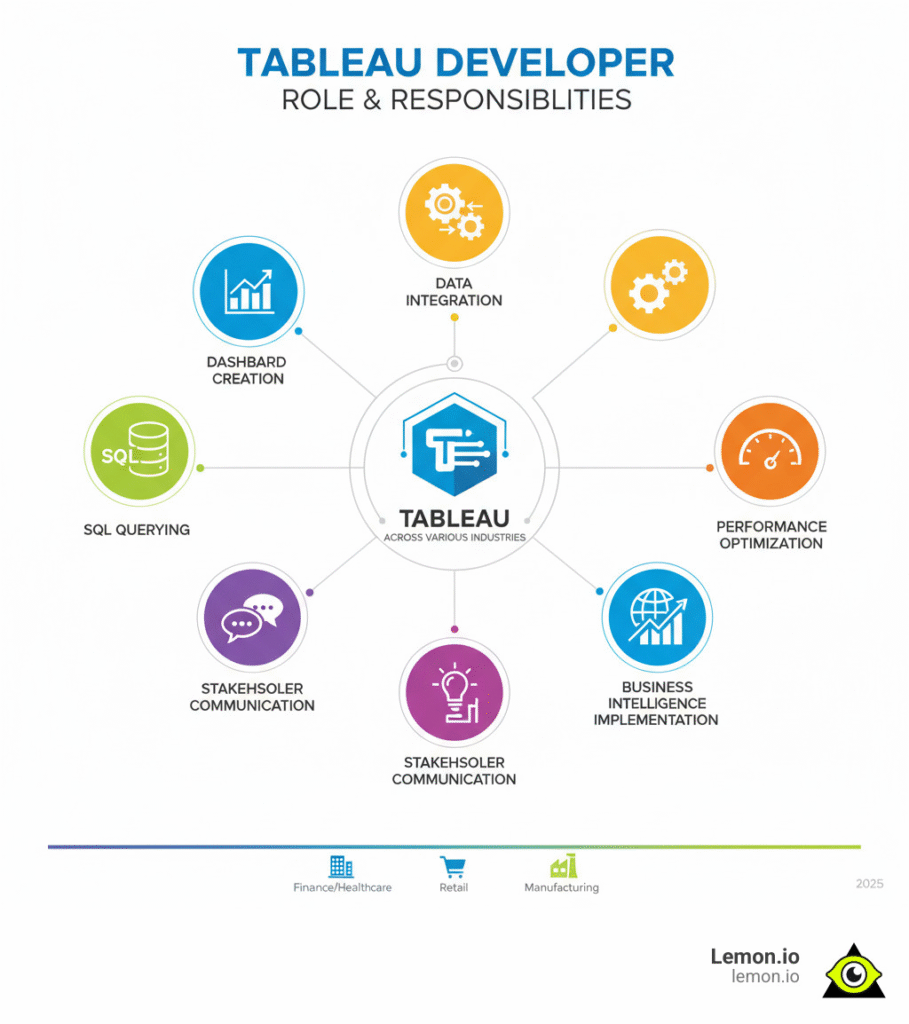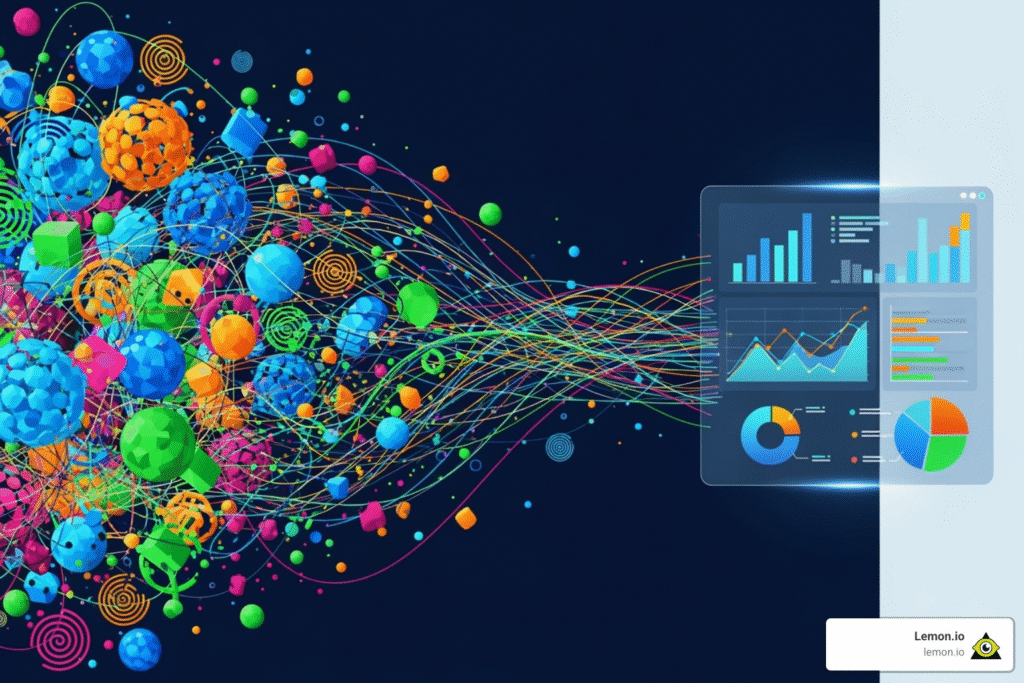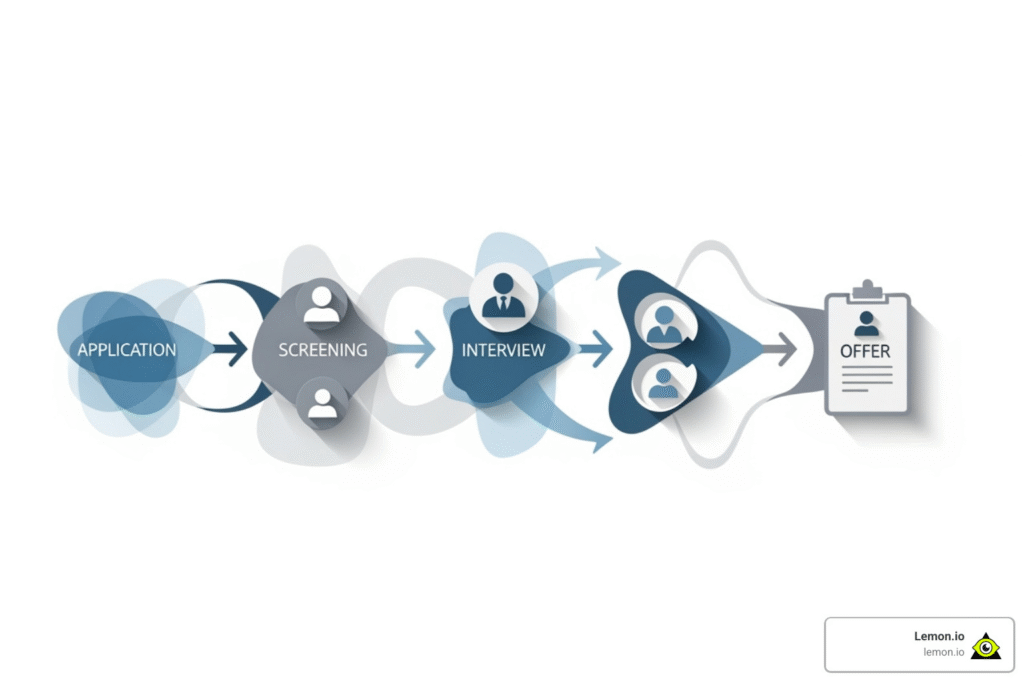Hire tableau developer – if you’re a startup or scaleup leader struggling to turn raw data into actionable insights, this is your roadmap to finding the right talent.
Quick Answer: Where & How to Hire Tableau Developers
- Cost Range: $18-150/hour freelance, $2,100-15,000/month full-time
- Timeline: 3-11 days for projects, 2-14 days to hire
- Top Platforms: Vetted talent networks, freelance marketplaces, tech job boards
- Key Skills: Tableau Desktop/Server, SQL, data visualization, storytelling
- Experience Levels: Junior (0-2 years), Mid-level (2-5 years), Senior (5+ years)
The business intelligence market is booming – projected to grow 11.11% annually and reach over $65 billion by 2030. Forbes recently ranked Tableau third on its list of technical skills with explosive job demand, citing a 1,581% increase in hiring.
But here’s the challenge: finding a Tableau developer who can transform your messy data into crystal-clear dashboards that actually drive decisions. It’s not just about pretty charts – you need someone who understands your business, speaks stakeholder language, and can optimize performance with massive datasets.
A skilled Tableau developer does more than create visualizations. They become your data translator – turning complex analytics into stories that help you spot trends, reduce costs, and accelerate growth. Whether you’re in finance tracking risk metrics, healthcare analyzing patient outcomes, or retail optimizing inventory, the right developer becomes your competitive edge.
I’m Aleksandr Volodarsky, and I’ve helped scale Lemon.io from $2.7M to $10M by understanding exactly what it takes to hire tableau developer talent that delivers results. Through our rigorous vetting process, I’ve seen how the right data visualization expert can transform a company’s decision-making capabilities.

The Business Case: Why Invest in a Tableau Developer?
Picture this: your company is drowning in spreadsheets, reports pile up on desks, and every meeting starts with someone saying “let me pull up the numbers.” Sound familiar? You’re not alone. Most businesses today are sitting on goldmines of data but lack the key to open up its value.
That’s exactly where deciding to hire tableau developer talent becomes a game-changer for your organization.
Think of raw data like a massive jigsaw puzzle scattered across your desk. All the pieces are there, but without someone skilled to put them together, you’ll never see the bigger picture. A talented Tableau developer becomes your puzzle master – changing chaotic data into clear, actionable insights that actually drive business decisions.
The impact goes far beyond pretty charts and colorful graphs. When you bring the right Data Analysis expertise into your team, you’re investing in improved decision-making across every department. Instead of relying on gut feelings or outdated reports, your leadership team gets real-time dashboards that reveal exactly what’s happening in your business.
But here’s where it gets really exciting – skilled developers excel at uncovering hidden trends and patterns buried in your data. That sudden spike in customer complaints? The seasonal inventory pattern you never noticed? The correlation between marketing spend and customer lifetime value? These insights were always there, waiting for someone with the right skills to bring them to light.
The market numbers tell an incredible story. The business intelligence and analytics market is absolutely exploding – growing at 11.11% annually and projected to hit over $65 billion by 2030. Forbes recently highlighted this surge, reporting a jaw-dropping 1,581% increase in demand for Tableau skills.
What’s driving this massive growth? Simple: companies are finally realizing that fostering a data-driven culture isn’t just a nice-to-have – it’s essential for survival. When everyone from your sales team to your C-suite can easily access and understand key metrics, magic happens. Decisions get made faster, strategies become more targeted, and innovation accelerates.
The beauty of Data Visualization is its universal application. Finance teams use Tableau for risk analysis, fraud detection, and investment tracking. Healthcare organizations monitor patient outcomes, optimize resource allocation, and track public health trends. Retail companies dive deep into customer behavior, inventory optimization, and supply chain analytics. Manufacturing operations get crystal-clear visibility into process efficiency, quality control, and production metrics.
For CTOs specifically, Tableau’s advanced analytics capabilities provide unprecedented insight into key business metrics, enabling more strategic technology decisions and better alignment with business objectives.
The bottom line? Every business generates data, and every business can benefit from having someone who knows how to make that data work harder. When you hire tableau developer talent, you’re not just filling a position – you’re investing in your company’s ability to see clearly, decide quickly, and compete effectively in an increasingly data-driven world.
The Anatomy of a Top-Tier Tableau Developer

When you’re looking to hire tableau developer talent, you’re not just hunting for someone who can drag and drop charts. You need a special combination of technical muscle and people skills – someone who truly understands the craft of Data Visualization Developers.
Think of it like finding the perfect chef. They need to know how to use a knife and work the stove (technical skills), but they also need the creativity to combine flavors and the communication skills to explain why tonight’s special will blow your mind (soft skills). Both are essential.
Essential Technical Skills
The best Tableau developers are like data magicians, but their tricks are built on solid technical foundations. When we vet candidates, we look for deep expertise in Tableau Desktop, Server, and Cloud – they need to master the entire ecosystem, not just one piece. This means building complex dashboards, publishing them seamlessly, and managing performance across different environments.
SQL and database management skills separate the pros from the amateurs. Your data lives in databases, and without strong SQL abilities, a developer can’t craft custom queries or ensure data quality. They need to speak fluent database, understanding how to extract exactly what they need efficiently.
Understanding data warehousing and ETL concepts is where things get really interesting. The best developers know how data flows from source to visualization, including tools like Tableau Prep for cleaning messy data. They think about the entire pipeline, not just the pretty dashboard at the end.
Data modeling expertise ensures your dashboards are built on rock-solid foundations. Poor data models create slow, confusing visualizations. Great ones make everything sing. Similarly, performance optimization skills become crucial when you’re dealing with massive datasets – knowing when to use extracts versus live connections can make or break user experience.
For advanced analytics, scripting with Python or R opens up possibilities beyond Tableau’s native capabilities. This often involves collaborating with Data Scientists to integrate machine learning models and predictive analytics into visualizations.
Crucial Soft Skills
Here’s where good developers become great ones. Strong analytical skills mean they don’t just create charts – they understand what the data is actually saying. They grasp exploratory data analysis principles and can spot patterns that others miss.
Communication and data storytelling might be the most underrated skill. Your developer needs to translate complex findings into stories that make sense to everyone from CEOs to front-line managers. They’re not just presenting numbers; they’re crafting narratives that drive action.
Problem-solving abilities become essential when data gets messy (which it always does). Real-world data has gaps, inconsistencies, and weird edge cases. Top developers thrive on these challenges rather than getting frustrated by them.
Attention to detail prevents those embarrassing moments when a mislabeled chart leads to wrong decisions. Creativity helps them choose the most impactful way to present information – sometimes a simple bar chart works better than a fancy interactive map.
Finally, collaboration skills tie everything together. Tableau projects involve data engineers, business analysts, stakeholders, and decision-makers. Understanding what role statistical analysis plays in data analysis is only valuable if you can explain it clearly to others.
The magic happens when technical expertise meets human insight. That’s when you get a Tableau developer who doesn’t just build dashboards – they build understanding.
How to Hire a Tableau Developer: A Step-by-Step Guide

Finding the right Tableau developer isn’t about posting a job and hoping for the best. It’s a strategic process that, when done right, connects you with someone who can transform your data chaos into crystal-clear insights. Here’s how to hire tableau developer talent that actually moves the needle for your business.
The key is being methodical. Start by understanding exactly what you need, then systematically work through sourcing, vetting, and onboarding the right person. Each step builds on the last, creating a hiring process that consistently delivers results.
Defining Your Needs: Junior, Mid-Level, or Senior?
Before you write a single job posting, get crystal clear on what level of expertise your project demands. This decision impacts everything from the complexity of problems they can solve to your budget expectations.
Junior developers (0-2 years of experience) excel at creating basic dashboards and simple data visualizations. They understand Tableau Desktop fundamentals and can connect to standard data sources. Perfect for straightforward reporting needs, but they’ll need guidance on complex calculations and performance optimization.
Mid-level developers (2-5 years) bring the sweet spot of capability and cost-effectiveness. They’re comfortable with advanced features like complex calculations, data blending, and basic performance tuning. They can work independently on most projects while still being budget-friendly.
Senior developers (5+ years) are your go-to for enterprise-level challenges. They architect complex data solutions, optimize performance with massive datasets, and mentor other team members. They command higher rates but deliver strategic value that justifies the investment.
Level |
Best For |
Typical Rate Range |
|
|---|---|---|---|
Junior |
0-2 years |
Simple dashboards, basic reporting |
$18-45/hour |
Mid-Level |
2-5 years |
Complex visualizations, data integration |
$45-85/hour |
Senior |
5+ years |
Enterprise solutions, team leadership |
$85-150/hour |
The sweet spot for most growing companies? Mid-level developers who can handle sophisticated requirements without the premium price tag of senior talent.
Where to Find and Hire Tableau Developer Talent
The best Tableau developers aren’t always actively job hunting. They’re often buried in interesting projects, which means you need to know where to look and how to attract them.
Lemon.io’s vetted talent network offers the fastest path to quality developers. Our manual vetting process means you’re only seeing candidates who’ve already proven their technical skills and communication abilities. No time wasted on unqualified applicants.
Freelance marketplaces give you access to a global talent pool. The trade-off? You’ll spend significant time sorting through applications and vetting candidates yourself.
Tech-focused job boards attract developers who are actively looking for new opportunities. These platforms tend to have higher-quality candidates than general job sites.
Tableau community forums and user groups are goldmines for finding passionate developers. People who contribute to the community often have deep expertise and genuine enthusiasm for the platform.
The Vetting Process: Key Interview Questions
A strong portfolio tells you about past work, but the right interview questions reveal how someone thinks and solves problems. Focus on scenarios that mirror your actual business challenges.
Start with technical depth questions that test their understanding of Tableau’s core concepts. “Explain the difference between a live connection and an extract in Tableau Cloud” reveals whether they understand performance implications and data architecture decisions.
Move into problem-solving scenarios with questions like “Describe a complex problem you solved using Tableau.” Listen for their thought process, not just the solution. Great developers break down problems systematically and consider multiple approaches.
Performance optimization questions separate good developers from great ones. “How do you optimize dashboard performance?” should trigger discussions about extract strategies, query optimization, and design best practices.
Don’t skip communication and collaboration questions. Ask about times they’ve had to explain technical concepts to non-technical stakeholders. Your Tableau developer will be translating between data and business decisions daily.
The best candidates combine technical expertise with curiosity about your business. They ask thoughtful questions about your data challenges and suggest approaches you hadn’t considered. That’s the kind of strategic thinking that transforms a good hire into a game-changing addition to your team.
The Anatomy of a Top-Tier Tableau Developer
This section needs an image of a word cloud showing key Tableau developer skills. Then discuss technical vs. soft skills. Mention data storytelling and business acumen. Link to Data Visualization Developers.
Essential Technical Skills
- Proficiency in Tableau Desktop, Server, and Cloud: Needs elaboration on what this entails (complex dashboards, customizing visualizations, optimizing performance).
- SQL and database management: Why is it important? (custom data extraction, manipulation, data integrity).
- Data warehousing and ETL concepts: Why is it important? (efficient data pipelines, tools like Tableau Prep).
- Data modeling: Why is it important? (structured data for optimal analysis).
- Performance optimization: Why is it important? (speed and efficiency with large datasets, extracts vs. live connections).
- Scripting with Python or R: Why is it important? (advanced analytics, predictive modeling, machine learning integration, collaboration with Data Scientists).
Crucial Soft Skills
- Strong Analytical Skills: Beyond visuals, interpret data, uncover patterns, statistical methods, exploratory data analysis.
- Communication and Data Storytelling: Translate complex findings into narratives for all stakeholders.
- Problem-Solving: Troubleshoot data issues, identify bottlenecks, devise creative solutions.
- Attention to Detail: Accuracy and reliability.
- Creativity: Design, layout, impactful visualization.
- Collaboration: Work with data engineers, business analysts, decision-makers. Link to What role does statistical analysis play in data analysis?.
How to Hire a Tableau Developer: A Step-by-Step Guide
Image: Flowchart of hiring process. General steps: Defining scope, job description, sourcing, vetting, interviewing, offer.
Defining Your Needs: Junior, Mid-Level, or Senior?
Table comparing Junior, Mid-level, and Senior Tableau developers based on years of experience, skill depth, project complexity, and autonomy. Stats: Junior (up to 2 years), Mid-level (2-5 years), Senior (5+ years). When to hire each level. Mid-level developers and advanced features.
Where to Find and Hire Tableau Developers
List platforms: Lemon.io’s vetted talent network, freelance marketplaces, tech-focused job boards, Tableau community forums. Emphasize Lemon.io’s unique selling points (rigorous vetting, fast matching).
The Vetting Process: Key Interview Questions
List interview questions from research. Review process: Portfolio, technical assessment, behavioral. How to ensure quality/reliability. Links: Tableau Cloud. Elaborate on what to look for in answers.
The Logistics: Costs, Timelines, and Integrations
Image: Graphic of hiring models and cost ranges. Hiring models: Offshore vs. in-house, project-based vs. full-time. Managing remote developers.
Understanding the Cost to Hire a Tableau Developer
Cost ranges: Hourly ($18-150), Full-time ($2100/month offshore, $70,000-$150,000/year in US). Factors: Experience, location, project complexity. Stat: Offshore hiring cost reduction (up to 50%).
Project Timelines and Tableau Integrations
Average project times: Dashboards (7 days), visualization (11 days), analytics reports (3 days). Integration examples: Databases (SQL), cloud platforms, CRMs, ERPs. Link: What are the top tools used for data visualization in startups?.
Frequently Asked Questions about Hiring Tableau Developers
When you’re ready to hire tableau developer talent, certain questions naturally come up. Let me address the most common ones I hear from CTOs and tech leaders.
What’s the difference between a Tableau Developer and a Data Analyst?
Think of it this way: a Tableau Developer is the architect who builds the house, while a Data Analyst is the person who lives in it and tells you what they see from each window.
Tableau Developers focus on building the visualization tools themselves. They’re the ones creating complex dashboards, optimizing performance, integrating data sources, and ensuring everything runs smoothly. They spend their time wrestling with SQL queries, designing interactive elements, and making sure your dashboards can handle thousands of users without crashing.
Data Analysts, on the other hand, use those tools to interpret what the data is telling us. They’re asking the business questions, spotting trends, and translating numbers into actionable insights for stakeholders. They might use Tableau dashboards that developers built, but their primary job is analysis and interpretation.
There’s definitely some overlap – many Tableau Developers have strong analytical skills, and many Data Analysts know their way around dashboard creation. But when you’re hiring, think about what you need more: someone to build robust, scalable visualization infrastructure, or someone to dive deep into your data and uncover business insights.
Is SQL a mandatory skill for a Tableau Developer?
Here’s the thing about Tableau – it’s designed to be user-friendly. You can absolutely connect to data sources and create visualizations without writing a single line of SQL. The drag-and-drop interface is genuinely intuitive.
But here’s why SQL knowledge is highly recommended, even if not strictly mandatory: it’s the difference between getting by and truly excelling.
A Tableau Developer with strong SQL skills can write custom queries for complex data changes, optimize performance by reducing the load on your databases, and handle tricky data manipulation that the visual interface simply can’t do. When you’re dealing with large datasets or complex business logic, SQL becomes your best friend.
Think of it like cooking. You can make a decent meal with pre-packaged ingredients, but if you know how to prepare everything from scratch, you’ll create something much more sophisticated and custom to your exact needs.
So while not every Tableau project requires deep SQL knowledge, the developers who have it will consistently deliver more robust, efficient, and flexible solutions.
How do I ensure the quality of a freelance Tableau developer?
Quality assurance starts before you even make a hire. The key is having a systematic approach to vetting candidates.
Start with a thorough portfolio review. Look for dashboards that are not just pretty, but functional. Can you understand the story they’re telling? Do the visualizations make sense for the data they’re presenting? Ask about the business impact of their previous projects.
Run them through a technical assessment. Give them a sample dataset and ask them to create a specific visualization or solve a particular problem. This reveals how they think through challenges and whether their technical skills match their claims.
Check references carefully. Previous clients can tell you about reliability, communication skills, and ability to meet deadlines. Don’t skip this step – it’s where you’ll learn about potential red flags.
Consider starting with a trial period or small project. This lets you evaluate their work quality, communication style, and reliability without a huge commitment.
The easiest way to ensure quality? Use a platform with a rigorous vetting process and satisfaction guarantees. At Lemon.io, we manually vet every developer, so you’re already working with the top 1% of talent. Plus, our month-to-month flexibility means you’re never locked into a bad fit.
The cheapest option rarely delivers the best value. Invest in quality upfront, and you’ll save time, money, and headaches down the road.










